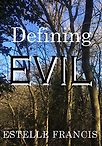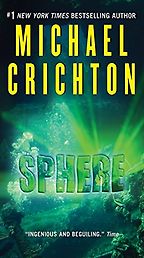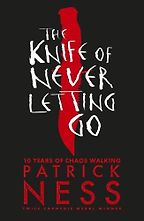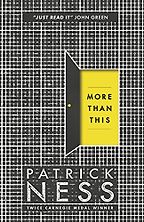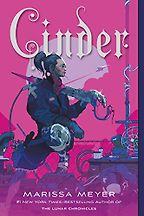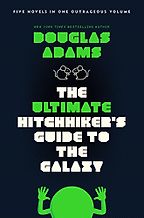Science fiction and fantasy are clearly the kind of young adult books which you find particularly captivating. Which books would you say you drew the most inspiration from while writing your own debut novel? Please tell us a little about the plot and the key ideas you explored.
My novel Defining Evil starts off with the aftermath of the mysterious murder of Prince Hayl Northbridge at his own public birthday party. As nobody saw anything, the Royals blamed anyone they suspected of being a rebel. The main characters end up travelling back in time to try and find out what really happened on the night.
My novel is very much a fantasy novel which also includes the sci-fi idea of time travel and the classic whodunnit. The reason I love these genres so much is because there’s such a wide range of ideas you can explore, with barriers and limitations that you create yourself. As a lover of mysteries, I have read countless Agatha Christie books—I love her writing style and ability to create plot twists that are so unexpected but not bizarre. My inspiration for the time travel element of my book was drawn from my interest in the subject after reading a combination of books such as Harry Potter and the Prisoner of Azkaban and Sphere, and the magical elements were mainly derived from my love of fantasy and wide imagination. I absolutely loved incorporating my favourite genres into my book!
What would you say was the greatest challenge of writing a novel independently at such a young age?
This is quite a hard question; I think the fact I’m still in school was a bit of a challenge. I definitely had less time than I would have liked to work on my novel during the week, so most of my writing was limited to weekends and long car journeys. But actually, writing the book isn’t the only part of the process—in snapshots of the day which were too short to pull out a notebook or start up my laptop, I would contemplate random plot and character ideas in my head. Not all of it made it into the final document, but a lot of the ideas sparked greater subplots that I have foreshadowed and will come into play in the sequel.
Onto your first book, Sphere by Michael Crichton. As with his other novels, including Jurassic Park, I was struck by the sharp scientific intelligence of his writing as he navigates a complex plot. What do you think makes this young adult science fiction book such a compelling read?
This has got to be one of my all-time favourite books. As you say, Crichton manages to incorporate countless scientific details without it becoming too overwhelming.
One of the ways in which Crichton makes this read so compelling is his writing style. He doesn’t create many long flowery passages of description, but rather gives the readers just enough to visualise his scenes in the amount of detail necessary. His characters are one of the elements which help drive the plot—the group dynamic creates passages of tension as well as humour which you just can’t help but laugh at!
The main character, Norman, a psychologist, adds humour that is relatable despite the situations that he’s put in, and Ted, a physicist, helps explain some of the very complex scientific ideas, making them easy to follow as well as intriguing. This book is just as much a psychological thriller as it is a sci-fi novel: there were so many places where I had to put the book down and just think over everything that was happening, and this makes the book such a page turner. It’s really addictive and that’s what I think makes it so compelling.
You also chose The Knife of Never Letting Go by Patrick Ness. Arguably one of the greatest young adult fiction writers today, he is known for his intensely original ideas: this science fiction book is the first in a trilogy set far into the future about a human colony on a distant planet, where the ‘Noise’ virus has enabled every thought to be heard by all. In today’s society where all information is becoming increasingly public and accessible, Ness clearly is dealing with themes that are very real to us.
Yes, and I thought it was very interesting that Ness had taken the idea of interconnectivity and increased access to personal information to the very extreme. The idea of the ‘noise’ virus makes us wonder how different our personal relationships would be if everyone around us could hear our constant buzz of thoughts. The story follows Todd, who on the verge of his thirteenth birthday is told by his guardians to run away. With no knowledge of the world outside his town, Todd is surprised to find a girl (there are no girls in Prentisstown) who has no ‘noise’. It was such an intriguing idea, and together with Ness’s way of unraveling the mysterious plot around the Mayor of Prentisstown and Aaron, the maniacal preacher, the book was a fast paced and emotional read.
One of the greatest features of this book is the characters themselves: Todd and Viola especially are young teenagers, vulnerable and deeply human, with whom the reader is quickly able to form a deep emotional connection. Do you think this could ultimately be seen as a coming of age novel?
Yes, I can definitely see this as a coming of age novel! The novel begins with Todd almost making the transition from boy to man, but running away before he can, and embarking on a journey that uncovers the remarkable flaws of his troubled society. As this is a young adult book, I think the people who read it will instantly be able to connect with the narrator and Viola, as they are both subject to the same emotions as the readers, including the fear of learning the truth, and developing both sense of self and morality, both things universally relatable.
That takes us onto your third young adult science fiction book, More Than This, also by Patrick Ness. This book is eerie and disorientating from the outset, and deals with some dark and troubling themes. How does the author manage to make this so intriguing?
Even though both the Patrick Ness novels on this list are sci-fi, they are intriguing in completely different ways. Personally, I think whilst the plot drives the story forward in The Knife of Never Letting Go, I feel as though it’s the characters in More Than This. The story begins dramatically with the main character, Seth, falling unconscious whilst seemingly drowning in an icy ocean. He then wakes up in a haunting rendition of his childhood town, complete with coffins which are all filled apart from his own. This book tackles the themes of guilt and facing the skeletons in your closet, as well as the sci-fi elements that unwind as the book moves forward with plot twists and turns at every corner. We learn of the crippling truth of the main character’s situation as the memories from his former life return in flashbacks.
Your fourth young adult science fiction book, Cinder by Marissa Meyer, takes a quirky spin on the classic fairytale and casts Cinderella as a young cyborg girl several hundred years in the future. I found all of her characters imaginative and endearing.
I completely agree; before reading Cinder I would never have thought about the tale being retold as a dystopian thriller with the main character being cyborg! I think it could also reflect the changing ways of the world as we become increasingly more capable with technology. Not only does the main character have mechanical parts, but she also owns an android which is able to have its own characteristics thanks to its personality chip. I think Meyer was clever in including this, as it essentially has us being able to relate with a robot.
Sign up here for our newsletter featuring the best children’s
and young adult books, as recommended by authors, teachers, librarians and,
of course, kids.
The tale does follow the classic Cinderella story to some extent, but has so many more elements that make it seem very original. Prince Kai commissions Cinder to fix his very old android, which is the beginning to the unfolding of secrets concerning the ‘Lunar’, a species that live on the moon. As pressures involving the formation of an alliance between Earth and Luna weigh down on the Kingdom, as well as the letumosis virus becoming more and more of a threat, the story weaves politics, technology, and fantasy with the classic fairytale that we all know and love.
A Hitchhiker’s Guide to the Galaxy by Douglas Adams has become a classic due to its (literally) timeless humour. The reader is left laughing aloud as we follow the main character through his hilariously random alien adventures through space and time. What places this book in your top five?
Whenever I think of sci-fi I think of The Hitchhiker’s Guide to the Galaxy—it is, as you say, a tale with countless humorous moments, and is so bizarre that I instantly fell in love with it. Even the smallest details have some humorous content: take Ford Prefect, for example, Arthur’s best friend, whose name itself holds comedic value as it refers to a car. Adams is also capable of creating such tension and suspense before relieving it with such a ridiculous outcome that the reader is left laughing and laughing. He’s also able to execute his wacky ideas in such a convincing fashion. Arthur, the main character, helps with this, as he is merely an unsuspecting human being caught up in the whirlwind of space. As readers, we are able to laugh at his reactions and sympathise with his denial and ridiculous behavior.
Five Books aims to keep its book recommendations and interviews up to date. If you are the interviewee and would like to update your choice of books (or even just what you say about them) please email us at [email protected]
Five Books interviews are expensive to produce. If you've enjoyed this interview, please support us by donating a small amount.

